
Hunstanton is a seaside town in Norfolk, England, which had a population of 4,229 at the 2011 Census. It faces west across The Wash. Hunstanton lies 102 miles (164 km) north-north-east of London and 40 miles (64 km) north-west of Norwich.
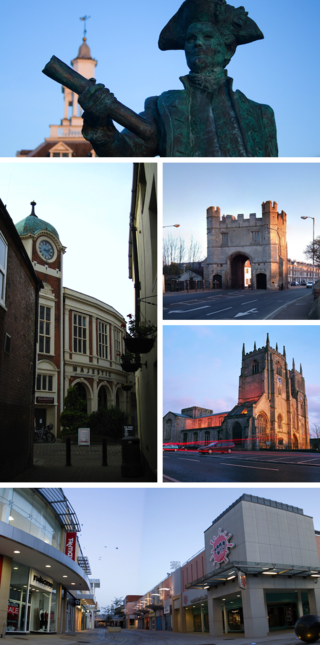
King's Lynn, known until 1537 as Bishop's Lynn and colloquially as Lynn, is a port and market town in the borough of King's Lynn and West Norfolk in the county of Norfolk, England. It is 36 miles (58 km) north-east of Peterborough, 44 miles (71 km) north-north-east of Cambridge and 44 miles (71 km) west of Norwich.

The Wash is a shallow natural rectangular bay and multiple estuary on the east coast of England in the United Kingdom. It is an inlet of the North Sea and is the largest multiple estuary system in the UK as well being the largest natural bay in England and is the outflow for the rivers Witham, Welland, Nene and the Great Ouse. It is also one of the most important places of conservation in Europe, with several nature reserves located within this area.

King's Lynn and West Norfolk is a local government district with borough status in Norfolk, England. Its council is based in the town of King's Lynn. The district also includes the towns of Downham Market and Hunstanton, along with numerous villages and surrounding rural areas. The population of the district at the 2021 census was 154,325.

North West Norfolk is a constituency represented in the House of Commons of the UK Parliament since 2019 by James Wild, a Conservative.

Heacham was a railway station which served the seaside resort of Heacham in Norfolk, England. Opened in 1862, the station became a junction where services left the King's Lynn to Hunstanton line for Wells on the West Norfolk Junction Railway, which opened in 1866. The station closed with the Hunstanton line in 1969.

Old Hunstanton is a village and civil parish in the English county of Norfolk. It covers an area of 5.35 km2 (2.07 sq mi) and had a population of 47 in 25 households at the 2001 census. The population had risen to 628 at the 2011 Census. For the purposes of local government, it falls within the district of King's Lynn and West Norfolk.
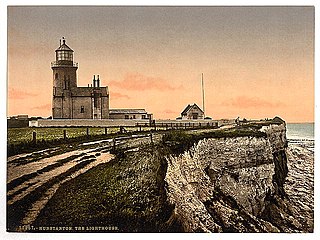
Old Hunstanton Lighthouse is a former lighthouse located in Old Hunstanton in the English county of Norfolk, generally called Hunstanton Lighthouse during its operational life. It was built at the highest point available on this part of the coast, on top of Hunstanton Cliffs, and served to help guide vessels into the safe water of Lynn Deeps. Although the present lighthouse was built in 1840, there had been a lighthouse on the site since the 17th century. Prior to the establishment of the Lynn Well light vessel in 1828, Hunstanton Lighthouse provided the only visible guide to ships seeking to enter The Wash at night.
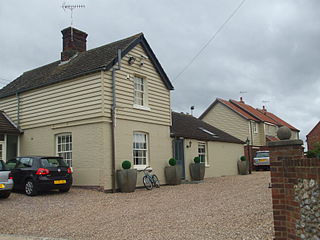
Burnham Market was a railway station which served the village of Burnham Market, Norfolk, England. Opened by the West Norfolk Junction railway in 1866, it closed with the line in 1952.

Stanhoe was a railway station which served the village of Stanhoe in Norfolk, England. Opened by the West Norfolk Junction Railway in 1866, it closed to passengers in 1952.

Sedgeford was a railway station which served the village of Sedgeford in Norfolk, England. Opened by the West Norfolk Junction Railway in 1866, passenger services ceased with the line in 1952.
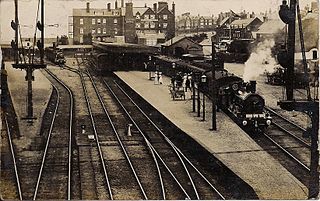
Hunstanton railway station served the seaside town of Hunstanton in Norfolk, England. Opened in 1862, the station was the northern terminus of the Lynn and Hunstanton Railway. The line was brought to public notice by John Betjeman in the British Transport Film John Betjeman Goes By Train. The station closed with the line in 1969.
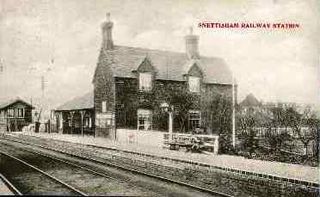
Snettisham was a railway station on the King's Lynn to Hunstanton line which served the village of Snettisham, a few miles north of King's Lynn in North Norfolk, England. Opened in 1862, the station closed along with the line in 1969.

Dersingham was a railway station on the King's Lynn to Hunstanton line which served the village of Dersingham, a few miles north of King's Lynn, in Norfolk, England.

North Wootton was a railway station on the King's Lynn to Hunstanton line which opened in 1862 to serve the village of North Wootton on the outskirts of King's Lynn in Norfolk, England. The station closed along with the line in 1969.
Sir Nicholas le Strange of Hunstanton, Norfolk, was an English Member of Parliament (MP) who held significant lands and offices in Norfolk.
Sir Hamon le Strange was an English politician who sat in the House of Commons at various times between 1614 and 1626. He supported the Royalist cause in the English Civil War. His family were Norfolk gentry long based at their manor of Hunstanton.

The Lynn and Hunstanton Railway was a line connecting King's Lynn and Hunstanton in Norfolk, England that opened in 1862. The railway was a major factor in developing Hunstanton as a seaside resort and residential community. The company was allied to the West Norfolk Junction Railway which built a line connecting Heacham, south of Hunstanton, to Wells-next-the-Sea that was not a financial success. The companies amalgamated in 1874 to form the Hunstanton and West Norfolk Railway, and in 1890 the company was sold to the Great Eastern Railway.
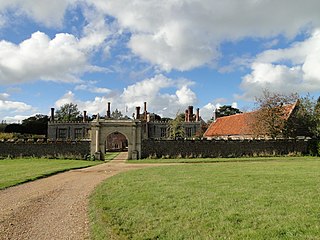
Hunstanton Hall, Old Hunstanton, Norfolk, England is a country house dating originally from the 15th century. The gatehouse, now detached from the main building, is dated 1487. The wings were built in the seventeenth century and there are Victorian additions. The house was the ancestral home of the L'Estrange family, resident from the time of Domesday until after World War II. During the early 20th century, P. G. Wodehouse, a friend of Charles Le Strange, was a frequent visitor and the hall features in his novel Money for Nothing (1928) and his collection of short stories Very Good, Jeeves (1930). The hall has also been suggested as a model for Blandings Castle. The building suffered two major fires, in 1853 and 1947. In 1948, the hall was sold and converted into apartments. Hunstanton Hall is a Grade I listed building.

Hunstanton Town Hall is a municipal building on The Green in Hunstanton, Norfolk, England. The structure, which is the meeting place of Hunstanton Town Council, is a grade II listed building.


















